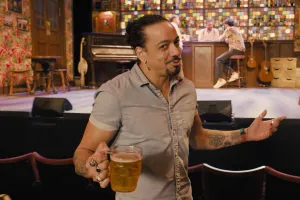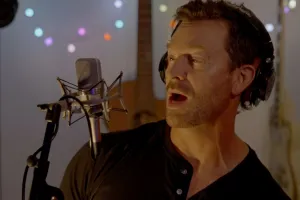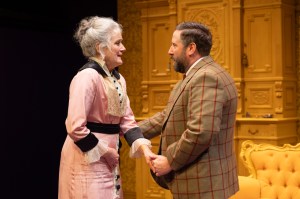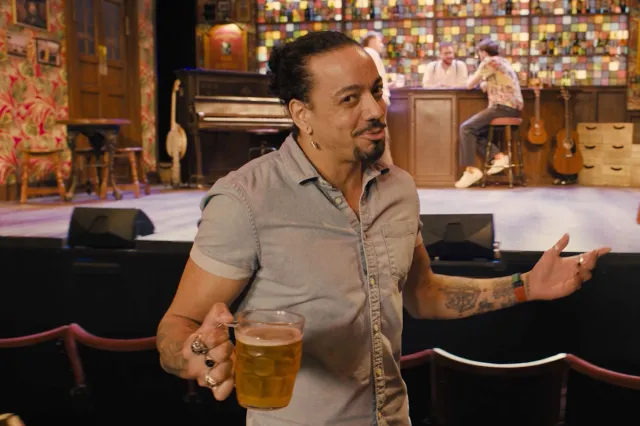20 Questions With… Anna Mackmin
Director Anna Mackmin – who, at short notice, replaced Kathy Burke as the director of Dying for It, premiering at the Almeida this week – explains the reason she chose directing over acting & why she avoids using all the colours in the paint box.
Anna Mackmin has been an associate director at Sheffield Crucible – where her productions included Cloud Nine, The Crucible and Iphigenia – and at west London’s Gate Theatre, where she most recently directed Ghosts.
Elsewhere, Mackmin’s credits include Amelia Bullmore’s Mammals (at the Bush and on tour), Breathing Corpses (Royal Court), Charlotte Jones’ The Dark (Donmar Warehouse), the acclaimed triple bill Burn/Chatroom/Citizenship (National), and in the West End, Auntie and Me, starring Alan Davies, and Charlotte Jones’ In Flame.
Mackmin made her Almeida Theatre directorial debut with another Charlotte Jones play, The Lightning Play, in November 2006. She has now returned to the theatre – taking over from Kathy Burke after she fell ill – to direct Moira Buffini’s adaptation of Nikolai Erdman’s The Suicide, renamed Dying for It.
Inspired by Erdman’s satirical Russian comedy, which was banned by Stalin before a single performance, Dying for It centres on Semyon, unemployed, living in the hallway and watching his wife Masha slave all the hours God sends. When his last hope to earn a crust and gain some self-respect disappears, he decides to take his own life. Word gets out of his intention and he finds himself inundated with visitors begging him to die on their behalf.
Date & place of birth
Born in Leeds in 1964.
Lives now in
At the moment, my husband and I are renting a place in Islington, so that’s an absolute delight to be walking to work at the Almeida every day.
Trained
I trained as an actress at the Central School of Speech and Drama. It was quite a circuitous route to directing. I felt I wanted something in my life I could control – because you’re never in control of an acting career – so I became a clothes designer and set up a business with my sister in Soho. After a while, I realised I’d been turning down all the acting work I was offered and had given up acting without really realising it. Then a friend of mine, Charlotte Jones, came into the shop and said “I’ve written a play, will you read it?” It was her first play. When I finished reading it, I sat up in bed and thought “I know exactly how I would direct this”. So we did the play at Battersea and it got me into directing and Charlotte – who was an actress – into writing, and my sister, who trained as a dancer, into choreography.
First big break
The person who I can credit my career as a director to is Michael Grandage. I had only directed two plays when he invited me to go to Sheffield and immediately made me an associate. I set up the literary department for him and he utterly supported where he thought my talents lay. He gave me an indispensable education, teaching me huge amounts about lighting and people management and running buildings.
Career highlights to date
I had a particularly memorable and happy time on Cloud Nine in Sheffield, and an extraordinary time doing The Crucible there. I was directing Amelia Bullmore as Elizabeth Proctor (in the Miller classic) when she gave me her play, Mammals to direct. That was another real highlight. And I’ve loved all the work I’ve done with Charlotte.
Favourite productions
I think it’s safe to say there are very few shows that I haven’t had a good time on – or if they’ve not been altogether enjoyable, they’ve been absolutely life-enhancing experiences. Theatre isn’t well enough paid not to love it!
Favourite actors
Oooh, I’m afraid that’s an unanswerable question for a director.
What other directors do you admire?
One of the things that’s been so fascinating in my work is how much you can learn by removing your own ego and studying what’s unique about other directors’ work. We’re really rich in directors at the moment, but there are too many good ones to mention.
Favourite playwrights
I’ve had great experiences working with Charlotte Jones, Amelia Bullmore and Mark Ravenhill. And I think Laura Wade is definitely a writer to look out for. The classics – Miller, Ibsen, Chekhov and Webster – are also favourites. And it was a wonderful accident to be offered Moira Buffini. She has a real uniqueness and truthfulness and a very theatrical voice.
What’s the last thing you saw on stage that you really enjoyed? And the first?
I just loved Caroline, Or Change. That was a piece where I had to entirely leave intellectual judgement outside and become immersed in the huge experience of the show. I went in with a completely open heart and I loved it. The first show I remember seeing was when I was 12. It was an experimental dance company in Norwich, and there was a dance about an adolescent girl in a bright buttercup yellow dress. She began to spin around and she was spinning and running, running and running all around the theatre, and I thought “wow, she’s exactly like me!”
If you hadn’t become involved in theatre, what might you have done professionally?
I would be an organic tomato farmer in Italy… I don’t know! I think that I’ll always be a theatre director, and I want to grow and develop in that role. I have no idea what I’d do if I didn’t work in theatre. I fully respect people like Nicholas Hytner who have managed to keep growing and developing and shifting roles in their careers.
What’s the best advice you ever received?
When I was an actor, George Hall, who was head of stage at Central, said to me in one of the end of year assessments: “The thing about you, Anna, is you have access to all the colours in the paint box, but you have to learn not to use them all at once.” I think that’s very true!
If you could swap places with one person (living or dead) for a day, who would it be?
My mother on the day my sister was born. It was a very particular time in our family history. And, as I’ve never given birth, I think it would be very interesting to experience that.
Favourite books
In times of crisis, I always reread Jane Austen. I also like George Eliot, Rose Tremain, Peter Carey and Jane Smiley. But I tend to swap my favourite book as often as I swap the idea of what my favourite last meal would be.
Favourite holiday destinations
There’s a particularly hilly spot in Italy that I love, although I don’t go there as much as I’d like to.
Favourite after-show haunts
My bedroom! I like pre-show rather than post-show socialising generally. Black’s is a good club in Soho, and Andrew Edmunds – also in Soho – does a really good romantic pre-show meal.
How did you get involved with Dying for It? What do you like about the play?
I did The Lightning Play here and had a very happy time working in the building, then immediately went to the Gate to do Ghosts. I had just put my feet up when Michael Attenborough (Almeida artistic director) phoned me. It was on the back of the fact I was freshly acquainted with the building having done The Lightning Play that got me this job. Something I realise increasingly is that I enjoy plays that swing on an absolute pin point between quite theatrical comedy and very deeply felt truthfulness. This is a play that definitely treads that line and that’s something that appeals to my tastebuds. It’s extraordinarily layered and it’s about the most important thing a play could be about, which is, why do we live? It is an unavoidably big subject, and I’m enjoying it immensely. It’s a great big huge play, so if I stop and think about it for too long it becomes rather scary!
How did it feel stepping into the role of director at short notice when Kathy Burke had to pull out?
At first. I thought there’s no way I can possibly go into rehearsals with less than 24 hours’ notice as I would usually have at least three months’ preparation time. I’m usually a new writing director so I generally spend that time with the writer. But, in ordinary circumstances, the play would be unturndownable, and decided I had to just not be a coward and approach it in the same way I would do had I been given it months earlier. I’m very lucky that I did because it’s fantastic.
What is it about the Almeida that appeals to you?
The stage itself is particularly exciting and dynamic from a director’s point of view. You get the benefit of a thrust stage but with the perspective of a proscenium arch so it’s intimate and epic at the same time. It’s also a very friendly building. It’s delightful to go into the green room and see people from all different departments who genuinely want to know how rehearsals are going and have a chat – they’re not just being polite. And the fact that everyone, from finance to creative, is in the same building gives a sense of ownership and connectedness to the theatre. I think that’s unique.
What’s your favourite line from Dying for It?
That changes every day – that’s the joy of rehearsing! In fact, one of the most interesting things about going into the play cold, not having any plans for it until rehearsals started, is finding different highs and lows. Usually, I go in and know full well where I’m aiming, though obviously things change slightly during the rehearsal process. But this time I am directing reactively as opposed to proactively, which is quite exciting.
What do you think audiences will enjoy most about Dying for It?
I hope the play will touch people in exactly the same way it would have done had it not been banned originally. Obviously, we live in a far more liberal society than the play is set in, but it’s a deeply unsettling play. We live in an age now when suicide is the biggest cause of death for men under 35. Dying for It has got a sort of delicious mix between period drama and that privileged feeling you get when you see a new play and think, I’m one of the first people to see this. It’s got big laughs, but mostly it’s a deeply felt and hopefully quite moving play. I think it should do what great theatre can sometimes achieve, which is, you’re so engrossed in the play you don’t have time to think about the experience until you step out of the theatre. It’s deeply provocative work.
What’s the oddest/funniest/most notable thing that’s happened in rehearsals or performances to date?
Talk about being thrown in at the deep end! Really, it’s remarkable being handed a play on a Sunday lunchtime and then stepping in on the Monday. We’re in week four of rehearsals as we speak and it still feels scary. But I’m working with a really lovely group of people and I’m in awe of Moira. It seems to me there’s a really delicate marriage between Erdman and Buffini. It’s a privilege to be exploring that line.
What are your future plans?
I’m completely delighted that the National have asked me to go back to remount Chatroom and Citizenship at the Cottesloe and on tour.
– Anna Mackmin was speaking to Caroline Ansdell
Dying for It opens on 15 March 2007 (previews from 8 March) at the Almeida, where it continues until 28 April.












